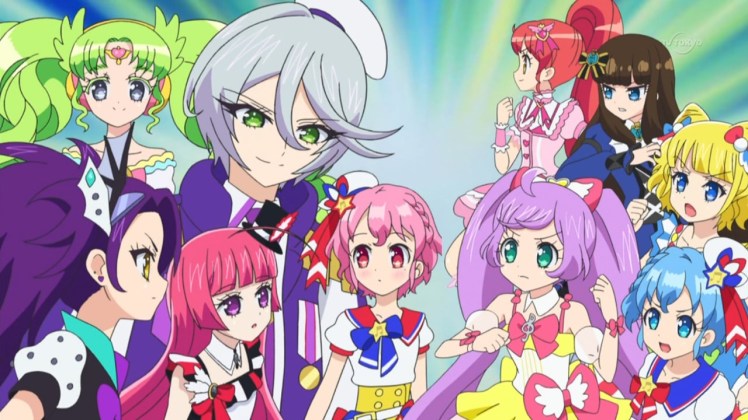 In July 2014 a TV anime based on a Japanese arcade game called PriPara started airing. The series was an alternate universe spin-off of a previous anime and arcade game, Pretty Rhythm, carrying over several themes from its predecessor. We began watching it the same week it started, having watched the last Pretty Rhythm series before it and it didn’t take long until we found ourselves in love with this brand new idol anime aimed at young girls.
In July 2014 a TV anime based on a Japanese arcade game called PriPara started airing. The series was an alternate universe spin-off of a previous anime and arcade game, Pretty Rhythm, carrying over several themes from its predecessor. We began watching it the same week it started, having watched the last Pretty Rhythm series before it and it didn’t take long until we found ourselves in love with this brand new idol anime aimed at young girls.
As we’re writing this, the series is about to wrap up its third season. After 140 episodes and 3 theatrical films PriPara will be going through a rebranding and relaunch next month with a new cast and theme. So we felt it was only appropriate to write about why PriPara is so incredibly special to us as a send-off to years of heart-warming entertainment. We’re going to be talking about plenty of story details, so consider this your spoiler warning. Though we’ll add that PriPara is a series that can very much be enjoyed for the first time despite knowing these details, as we also took an extended break from the series during which much was spoiled for us.
So let’s go on a journey of breaking gender norms, healing trauma and finding acceptance in PriPara.
 So let’s first answer the obvious question; what is PriPara? The name is pronounced “puri-para” and it’s short for Prism Paradise, but that doesn’t really tell you anything of importance. PriPara is a story about a world similar to our own where every girl in the world receives, at some point in her life, what’s called a PriTicket. With a PriTicket, she can enter what is essentially a gigantic virtual world known as PriPara. When a girl steps inside PriPara, she transforms into an avatar based on her personality. Not unlike your traditional magical girl anime, these transformations can both change physical details and the girl’s outfit.
So let’s first answer the obvious question; what is PriPara? The name is pronounced “puri-para” and it’s short for Prism Paradise, but that doesn’t really tell you anything of importance. PriPara is a story about a world similar to our own where every girl in the world receives, at some point in her life, what’s called a PriTicket. With a PriTicket, she can enter what is essentially a gigantic virtual world known as PriPara. When a girl steps inside PriPara, she transforms into an avatar based on her personality. Not unlike your traditional magical girl anime, these transformations can both change physical details and the girl’s outfit.
Once inside PriPara girls can engage in social activities, attend attractions or simply hang around the colourful dreamland they’ve stepped into. But if they’re feeling up for it, they can also become an idol and perform on stage. This is where the basic core of the series lies, as the cast form idol units and try to become the highest ranked idols. A former acquaintance of ours described PriPara as “some kind of VR Club Penguin only instead of penguins. everyone are idols” which we suppose is apt to get the idea across. Now that you know the basics, let’s talk about what makes PriPara stand out from every other idol anime I’ve seen. Because two recurring themes in PriPara are gender and body norms, both of which it handles really well.
We’d say “acceptance” is pretty much the official theme of PriPara as a whole. A mere thirty seconds into the first episode we’re introduced to what would be our first example of it. The main character, Manaka Lala, is constantly told that she has a loud voice. It’s something she can’t really help, but she’s painfully aware how annoying people find it. As such when she’s asked to sing together with Minami Mirei, an idol inside PriPara, she purposefully tries to keep her voice down. It’s here where Mirei tells her to let loose and be loud, causing Lala to realize that she now have a place where people won’t be troubled by her voice. It’s small in comparison to what we’ll talk about later on, but it perfectly encapsulates what the series is all about in one single episode. That no matter who you are, there will be places and people who accept you.
Essentially every character introduced in PriPara follows this concept in some variety, be they part of the main cast or side characters. The main character Houjou Sophie is another example of this, where she had been told that due to her weak constitution she couldn’t do things on her own and it was best to let people basically take charge of her. After meeting Lala and Mirei she gets the strength to ask people to let her try things on her own, even if she might fail. She’ll still need help with things every now and then, but now it’s at her own request. It’s a simple but effective character arc that teaches Sophie, and those watching, that putting your best effort into something is always commendable and that asking for help when things get too hard is by no means a sign of weakness.
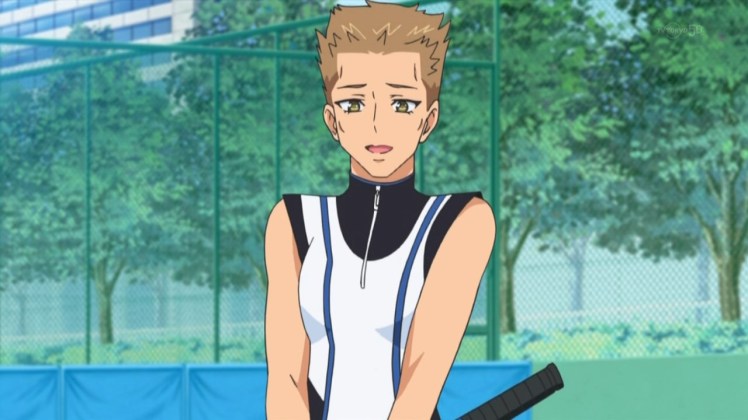 So let’s talk about how this applies to gender norms, starting with a recurring side character that first appears in episode 4 named Tochiotome Love. Love is a tennis player with what would unfortunately be described as a traditionally male build. She’s very tall, got broad shoulders and a rather sharp facial structure. In episode 10 we learn that she’s never gone to PriPara because she thinks she’ll be treated as an outsider because of her build. She wants to look more feminine but has basically given up that idea. Lala takes Love to PriPara, insisting that she will not be an outsider and that her view of herself will change.
So let’s talk about how this applies to gender norms, starting with a recurring side character that first appears in episode 4 named Tochiotome Love. Love is a tennis player with what would unfortunately be described as a traditionally male build. She’s very tall, got broad shoulders and a rather sharp facial structure. In episode 10 we learn that she’s never gone to PriPara because she thinks she’ll be treated as an outsider because of her build. She wants to look more feminine but has basically given up that idea. Lala takes Love to PriPara, insisting that she will not be an outsider and that her view of herself will change.
When Love goes through her PriPara transformation she keeps her height, shoulders and facial structure. What the system gives her is a beautiful dark-blue dress, longer hair and some light makeup to highlight her features. Upon seeing herself in the mirror inside PriPara, she can’t believe her eyes. For the first time ever Love doesn’t hate her features, she finds herself cute. She exclaims, with tears of joy in her eyes, “Incredible! I feel reborn! You can be cute even if you’re tall!” as Lala responds that indeed “Every girl can be cute“.
But it doesn’t end there. As Love gets noticed by the other girls inside PriPara we get their reactions as well, all of which are positive and encouraging. Everyone loves the cool beauty who suddenly appears, saying she looks like a super model and asking for her name. But most importantly, Love’s reaction to all of this is her statement that she’s feeling confident. As someone who’s a tall, broad-shouldered lady with sharp facial features we found this character and episode one of the most positive reassurances that even someone like us (i.e. non-passing) can love the way they look and even be cute should we want that.
It’s never stated that Love is trans, but it’s very easy to make the connection between her self-image to that of many trans women. We personally couldn’t help but view her as trans as we watched the episode the first time and the same goes for later episodes and rewatches. Intentional or not, PriPara made what might be the most positive and accepting portrayal of trans women in anime with Love’s character. Nobody ever bashes Love for her build, not during her reveal or later episodes. She’s always looked up to by the people around her as a beautiful woman whose height and etc. only enhances her lovely appearance.
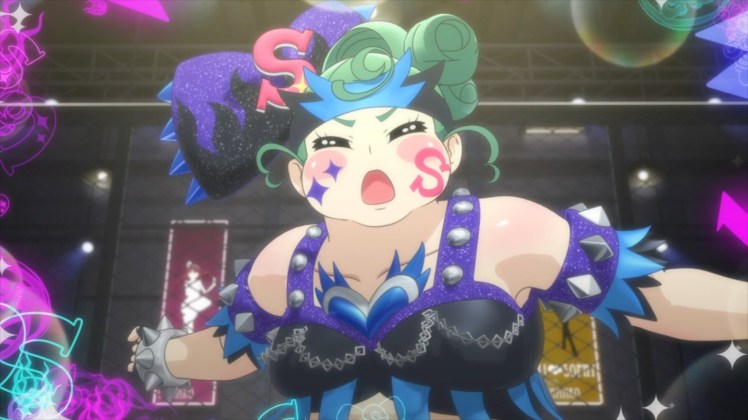 Love isn’t the only woman with an unconventional body type that’s treated this way either. Another side character named Chanko is a recurring character throughout all three seasons and even gets to debut as an idol later on. Chanko is part of the top-idol Sophie’s Fan Club, serving as one of her personal bodyguards if needed. She’s a large girl and would normally be the type of character that’s relegated to joke scenes about food or brawn-over-brains in many other series, especially in idol culture which is already fixated with diets and being as conventionally attractive as you can be.
Love isn’t the only woman with an unconventional body type that’s treated this way either. Another side character named Chanko is a recurring character throughout all three seasons and even gets to debut as an idol later on. Chanko is part of the top-idol Sophie’s Fan Club, serving as one of her personal bodyguards if needed. She’s a large girl and would normally be the type of character that’s relegated to joke scenes about food or brawn-over-brains in many other series, especially in idol culture which is already fixated with diets and being as conventionally attractive as you can be.
But Chanko is not treated that way, at least not after her first few appearances. She’s very reliable and is one of the first people outside of the main characters to realize that Sophie’s restricted behaviour is bad for her. She does gravure photo shoots after her idol debut, often some of the more daring ones too as the girls of PriPara find her very attractive and her idol type is officially “sexy”. Even when she is part of an eating contest along with other idols, PriPara made sure to not make her into the punchline of the scene just because of her weight. When she finally gets to perform as an idol she’s given a fantastic solo number and later even forms an idol unit to compete in the final tournament of the series. Seeing a large girl be given this equal treatment, in an idol anime no less, is beautiful to say the least. We loved Chanko when she was a minor character in Sophie’s Fan Club and we love her even more having seen her grow.
The series also decides to cover women with deeper voices. Starting with Sophie, who has a soft and light voice when speaking but a deep and commanding voice when singing. It’s still a voice that would be accepted as feminine, but PriPara doesn’t stop at her. Later we meet Toudou Shion, who have a depper and stronger voice both in speech and song, to the point where it’s the first thing anybody notices about her. Of course, with this being PriPara they notice it with admiration. Shion’s voice was another example of me feeling confidence in ourselves because of the series’ positive depiction of women with deeper voices.
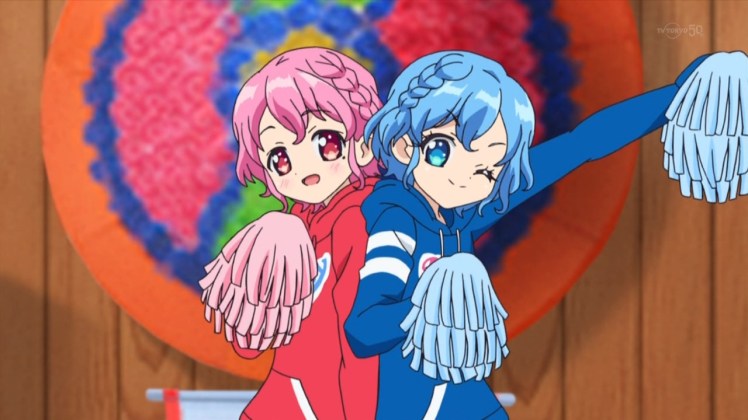 So we’ve had acceptance of tall women, large women and women with deeper voices, but here’s where the main course for PriPara‘s treatment of gender norms comes in. We’re going to talk about two main characters, Leona West (also called Reona West) and Shikyoin Hibiki. Let’s start with Leona, as he’s the first character of the two that we meet. You might have noticed we said “he”, because it just so happens that Leona is the only boy in the main cast. While PriPara is stated to be a place for girls and it’s girls that get the magic PriTickets to let the even access the place, Leona is an exception. Before we get into why this exception was made, we need to talk about Leona as a character.
So we’ve had acceptance of tall women, large women and women with deeper voices, but here’s where the main course for PriPara‘s treatment of gender norms comes in. We’re going to talk about two main characters, Leona West (also called Reona West) and Shikyoin Hibiki. Let’s start with Leona, as he’s the first character of the two that we meet. You might have noticed we said “he”, because it just so happens that Leona is the only boy in the main cast. While PriPara is stated to be a place for girls and it’s girls that get the magic PriTickets to let the even access the place, Leona is an exception. Before we get into why this exception was made, we need to talk about Leona as a character.
Leona is the twin brother of Dorothy West. They look alike, with some key differences. The biggest difference is that Leona has pink hair while Dorothy has blue hair, starting us off with the reverse of what is considered the classic gender colours. Leona and Dorothy share their wardrobe, because Leona wants to dress in skirts and dresses and Dorothy is accepting of this. In fact, Leona has always enjoyed things that others would describe as girly and he’d get bullied for it from time to time. The only one that was there for him when this would happen was his sister who would always stand up for her brother no matter what he wanted to do.
However, Leona doesn’t exactly seem uncomfortable with being a boy. What he’s uncomfortable with is having to live up to predetermined values because of being a boy. He’s got a petite build and his face is no more masculine than his sister’s, but that doesn’t bother him at all. All he want is to be able to be himself without being mistreated, to express himself in an environment where everyone will love and respect him even if he dresses in what they’ll call girl’s clothes. He wants to be the cute princess if cast in a play, he wants to be himself despite that his own self isn’t reflective of what people expect of him because of his gender.
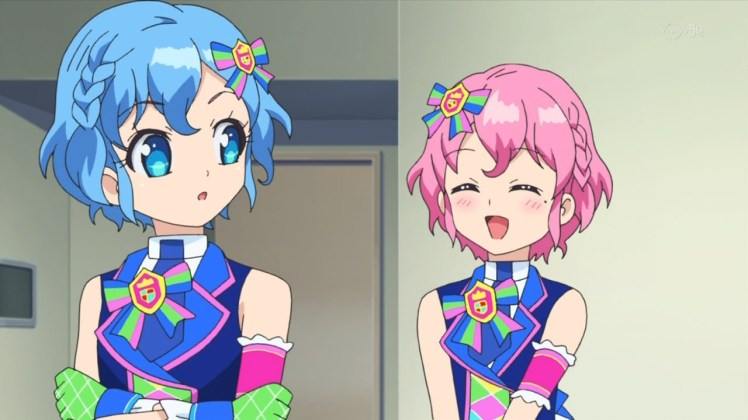 PriPara therefore bestows upon him a PriTicket alongside his sister. PriPara’s system is somewhat of a hybrid of magic and technology, all being controlled by the goddess Jewlie. We mention this because it’s her making this personal and subjective decision, as the system, that allows Leona to enter PriPara despite being a boy. In PriPara he can express himself as who he is and everyone will love him regardless. To the people inside PriPara, the exception being made for Leona is never explained, but since it happened that means it’s something to be accepted.
PriPara therefore bestows upon him a PriTicket alongside his sister. PriPara’s system is somewhat of a hybrid of magic and technology, all being controlled by the goddess Jewlie. We mention this because it’s her making this personal and subjective decision, as the system, that allows Leona to enter PriPara despite being a boy. In PriPara he can express himself as who he is and everyone will love him regardless. To the people inside PriPara, the exception being made for Leona is never explained, but since it happened that means it’s something to be accepted.
Even so, Leona is very shy and worried that he’ll be mistreated so he always sticks to his sister. As such, when we first meet Leona and Dorothy they’re inseparable and Dorothy basically do all the talking and action for the two. As the episodes go on, Leona and Dorothy make friends with the cast and eventually transfer to the same school as the rest. This is when the other characters learn Leona is a boy, as they meet him in his school uniform for the first time.
The scene, which could have been gross and transphobic, is quite brilliant in its execution. The girls who’ve only seen Leona inside PriPara have an initial surprise when he appears in front of them, which was the point where we braced ourselves for stopping the episode and never watch the show again. Mirei asks Leona if he’s a boy, to which he replies that he is. After this, everyone has already calmed down from their surprise. Next up Lala asks, in a curious and non-threatening manner, how it comes that he normally dresses the way he does? Leona responds that him and Dorothy have always shared the same clothes, and that’s just how they do it. Dorothy adds that matching outfits is obviously fit for their stage personas too.
After that, the only thing that still confuses them is how he can get into PriPara. So they show his PriTicket, bestowed upon him by the PriPara system, to which everyone considers the case closed and no part of it is questioned again for the entirety of the series. Leona’s a boy who dresses in skirts and goes to PriPara, and that’s okay with everyone. The confusion comes off less as disgust or degrading and more as a genuine interest in their friend, wanting to know them better and Leona isn’t uncomfortable with telling them.
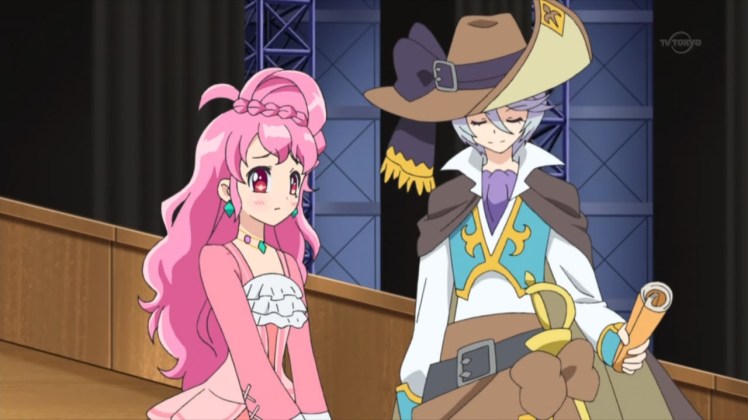
We do want to add that we appreciate that despite being a boy who dresses in skirts and like traditionally girly things, PriPara still opted to not simply put emasculating stereotypes onto Leona. For example, he’s still the stronger of the two twins and those who find him cute, meaning practically every character, view him as cute through an admiring perspective rather than treating him like a small defenceless animal. In fact, it’s worth mentioning that Leona still have both boys and girls completely fall head over heels for him after knowing his gender.
What’s interesting about Leona is how little he actually cares about gender. No, he’s got no problem admitting he’s a boy but if someone mistakes him for a girl he doesn’t feel any harm from it. It’d be easy to argue that he’s genderfluid, though much like in the case of Love that’s never anything stated canonically. You can also read him as a trans girl, thanks to scenes such as when he’s referred to by a group of kindergarten kids he’s helping as “onee-chan” (big sis) without seeming to mind at all. In fact, the first time we see Leona feeling uncomfortable regarding gender is with the appearance of Shikyoin Hibiki.
Hibiki appears in the second season and serves as the antagonist for most of it. She’s a girl who was mistaken for a boy and scouted as a model when she was a child, but decided to play along with this misunderstanding. We’ll get into the reasons why she did this later, but what you need to know first is that she’s become a massive movie star and been titled the “Ultimate Prince” by her fans. She never actually says she’s a boy, she just doesn’t correct anyone or state otherwise. The only exception is her alter-ego, the Phantom Thief Genius where she states she’s a boy to keep her identity a mystery, as boys shouldn’t be able to get into PriPara.
This is where the connection to Leona comes in. After Genius appears and steals a plot relevant item, everyone in the audience start asking how a boy got into PriPara, with some even calling it gross that he was able to get in. The series makes sure that we see Leona hear this, and though he doesn’t say a word, you can tell the words around him are hurting him. For the first time ever he feels like he doesn’t belong in PriPara. It continues as even his sister Dorothy ends up slipping up and talking about how “boys can’t get into PriPara” before catching what she’s saying and turning to Leona to acknowledge that she didn’t forget about him.
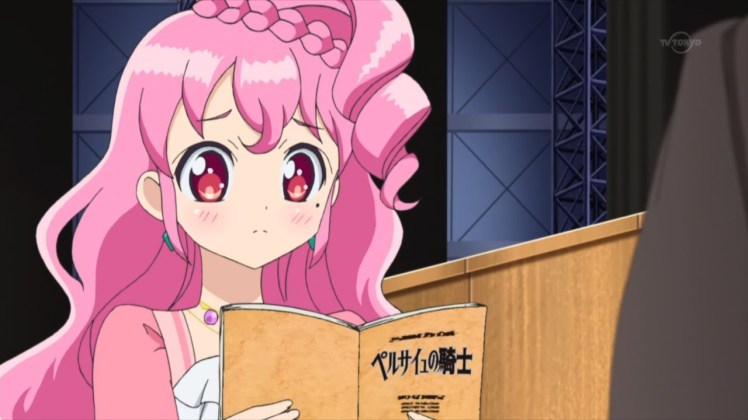 As such, when Genius is revealed to be Hibiki and in turn Hibiki reveals that she’s actually a girl, and quite proud of it too, Leona is even more confused. Why would Hibiki pretend to be a boy? He wonders if they might be dressing and acting the way they do for the same reasons, and decides that he wants to talk to Hibiki about it directly. As such, after crashing a rehearsal Hibiki is at, Leona gets his wish. Hibiki says that if Leona takes the role of the princess during the rehearsal she’ll answer the questions he had for her. Leona, who always wanted to dress up like a princess anyway, does his part and then get to ask Hibiki the question on his mind.
As such, when Genius is revealed to be Hibiki and in turn Hibiki reveals that she’s actually a girl, and quite proud of it too, Leona is even more confused. Why would Hibiki pretend to be a boy? He wonders if they might be dressing and acting the way they do for the same reasons, and decides that he wants to talk to Hibiki about it directly. As such, after crashing a rehearsal Hibiki is at, Leona gets his wish. Hibiki says that if Leona takes the role of the princess during the rehearsal she’ll answer the questions he had for her. Leona, who always wanted to dress up like a princess anyway, does his part and then get to ask Hibiki the question on his mind.
Hibiki simply responds that she considers the world itself to be a farce, so playing along as a role different from yourself is no problem. Again, we’ll get to what she actually means by this later, but after her response she returns the question to Leona. Why does he dress and act the way he does? Leona, who haven’t been asked this since early in season one when he was shy and unable to speak for himself, finally realizes that he can say what he always wanted to say. So he declares, with pride, that he dresses and acts the way he does because “I’m fine as I am!“, a simple declaration of how there’s nothing wrong with who he is and that he fully knows this now. Hibiki accepts the answer with a smile.
After this moment, Leona finds peace in the conclusion that him and Hibiki are different yet similar. But more importantly he doesn’t feel wrong for being himself and still going to PriPara like he did during the encounters with Genius. The person that caused him grief and worry helped him reach confidence and put him back on his feet. It’s a beautiful extra piece of character development that wasn’t necessary for Leona, as he was already a very solid character, but we’re glad it was included.
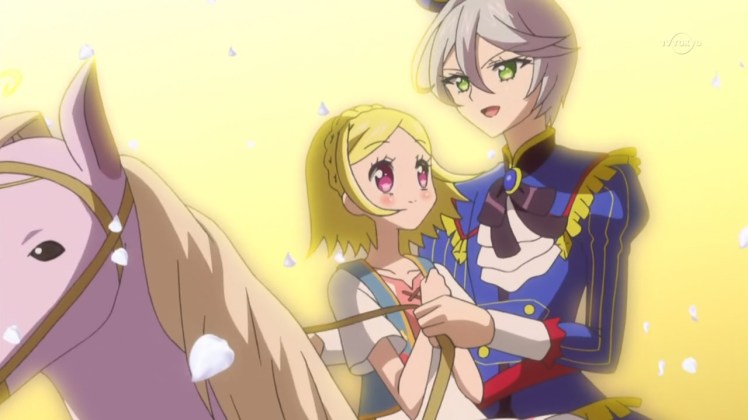 So with Leona wrapped up, let’s go back to Hibiki. As we mentioned, she’s a girl who’ve been playing the role of a boy for most of her life and found success in doing so. But when she goes up on the stage at PriPara for her first performance, her big reveal is anything but dramatic. Instead, all Hibiki does is go up on stage and declares, almost nonchalantly, “oh, by the way. I’m a girl” to the audience. Much like with Leona the initial response is surprise and what follows is immediate acceptance. Her fans don’t change view of her and when asked if she’ll take on different jobs or dress differently after “coming out” as a girl Hibiki simply responds that she’s not planning on changing a thing.
So with Leona wrapped up, let’s go back to Hibiki. As we mentioned, she’s a girl who’ve been playing the role of a boy for most of her life and found success in doing so. But when she goes up on the stage at PriPara for her first performance, her big reveal is anything but dramatic. Instead, all Hibiki does is go up on stage and declares, almost nonchalantly, “oh, by the way. I’m a girl” to the audience. Much like with Leona the initial response is surprise and what follows is immediate acceptance. Her fans don’t change view of her and when asked if she’ll take on different jobs or dress differently after “coming out” as a girl Hibiki simply responds that she’s not planning on changing a thing.
Of course, if that was all there was to Hibiki she’d simply be the same kind of character Leona was, but self-confident from the start. But there’s far more to Hibiki than that essentially the entire second season is devoted to slowly unwrapping her character. We’re first introduced to Hibiki through a different character, a girl named Midorikaze Fuwari. Fuwari met Hibiki in her home country, and Hibiki had been so taken aback by Fuwari that she asked her to become a Princess Scholarship Student at the school the main characters attend. What this entailed was that Fuwari was to attend school to become the “Ultimate Princess” to Hibiki’s “Ultimate Prince”, should she choose to accept her request.
At this point, Fuwari thinks Hibiki is a boy like everyone else. She finds herself having fallen for Hibiki and decides to take her up on the offer. However, the more time she spends with Hibiki the less she understands her. There’s a secret waiting to be unveiled and eventually she decides that she can’t be the princess Hibiki wants, and rejects the scholarship. After learning Hibiki is a girl, she asks her just how much of what she told her was a lie. Hibiki, in a very cruel way, reveals that she’s been lying to her all along. After this, Fuwari leaves the school with no plans on returning.
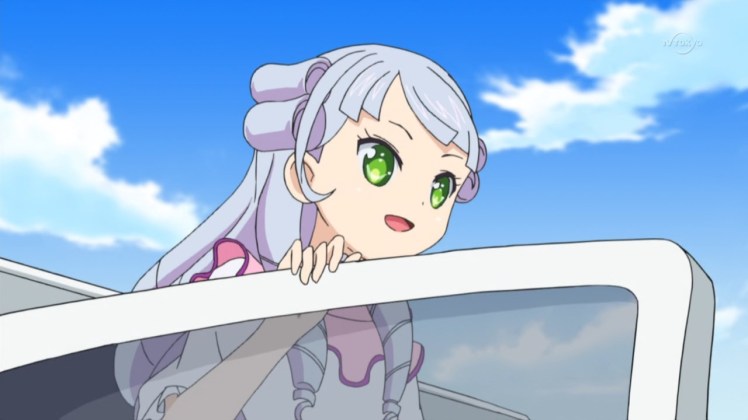 It’s at this point that Hibiki is fully established as the series villain and it’s hard to see how she could possibly be redeemed. This is where we start learning about the secret that Fuwari could never reach and how PriPara deals with personal trauma, all relating to Hibiki’s childhood. Hibiki was a child of a wealthy family and used to run around with long curly hair fitting a classic princess look. She had a lot of friends and she enjoyed theatre a lot. Her very deep voice made her skilled at playing male roles like princes, something she’d use again later in life. However, one day she got a phone call stating that both her parents had been lost at sea following the sinking of the cruiser ship they were on.
It’s at this point that Hibiki is fully established as the series villain and it’s hard to see how she could possibly be redeemed. This is where we start learning about the secret that Fuwari could never reach and how PriPara deals with personal trauma, all relating to Hibiki’s childhood. Hibiki was a child of a wealthy family and used to run around with long curly hair fitting a classic princess look. She had a lot of friends and she enjoyed theatre a lot. Her very deep voice made her skilled at playing male roles like princes, something she’d use again later in life. However, one day she got a phone call stating that both her parents had been lost at sea following the sinking of the cruiser ship they were on.
While distraught with the news, the servants of the house started leaving, objects of value were taken away and suddenly her friends were leaving too. The supposed friends had only wanted to be with her because of her wealth and getting to be in her fancy home, knocking her away when she begged them to stay. Left alone, she was scared and unable to fully fathom what happened. Eventually she got a second phone call stating that her parents had been found. Suddenly the servants, objects of value and friends started coming back. At this point however, Hibiki had no interest in their false friendship and threw them all out.
Hibiki spent a lot of time after this on her own, wanting no further interaction with people. She viewed the concept of friends as a a farce, leading to her cynical view of the world mentioned during her conversation with Leona. She had grown scared and anti-social as the events made her develop massive abandonment issues. Things were about to get even worse however, as a girl named Kiki Ajimi had been spying on her through a window for a while now, interested in befriending Hibiki. Without going into detail, let’s simply say that Ajimi has a very strong and eccentric personality that someone who’s already uncomfortable with people will find very intimidating.
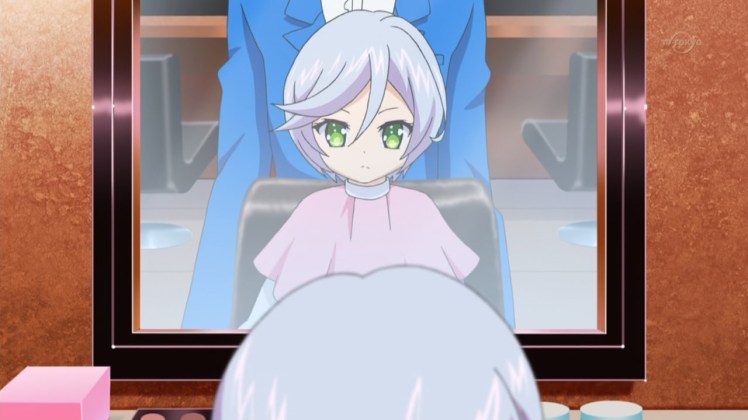 However, Ajimi have issues with sensing people’s boundaries and at the time she was just a child herself, so she tries to approach Hibiki over and over. It leads to Hibiki actually beginning to move cities and countries to get away from her. Ajimi has basically become Hibiki’s stalker and because Hibiki is too scared of interactions to actually clearly state a no to Ajimi, it doesn’t end. Finally, Hibiki decides to disguise herself as a boy by cutting off her hair and dressing differently to hide from Ajimi. This is where she got mistaken for a boy and scouted as a model.
However, Ajimi have issues with sensing people’s boundaries and at the time she was just a child herself, so she tries to approach Hibiki over and over. It leads to Hibiki actually beginning to move cities and countries to get away from her. Ajimi has basically become Hibiki’s stalker and because Hibiki is too scared of interactions to actually clearly state a no to Ajimi, it doesn’t end. Finally, Hibiki decides to disguise herself as a boy by cutting off her hair and dressing differently to hide from Ajimi. This is where she got mistaken for a boy and scouted as a model.
Hibiki created a false persona as a defence against ever being hurt again, this persona being the boy who would become known as the Ultimate Prince. After spending so much time playing her role with such deep cynicism and trauma behind it she basically become the type of person who hurt her. Someone who’d lie and manipulate others for their own gain and enjoyment. She justifies it to herself by telling herself that everyone else is just lying and playing a role as well.
It’s at this point in the story where it’s clear that Hibiki needs saving more than anyone else, as she’s heading down a deeply destructive path. Having spent time thinking on things, Fuwari returns with one single intention. To help heal Hibiki’s pain and take her side as her princess regardless of having turned it down. This is where Hibiki’s gender once again becomes important. Hibiki is a girl and only started acting as a boy out of a traumatic experience, but Hibiki doesn’t view that part of herself as traumatic. If Hibiki was a boy, she likely wouldn’t mind it, she seemingly doesn’t view her gender role as anything positive or negative. Even if she’s a girl, she enjoys the part of playing a prince.
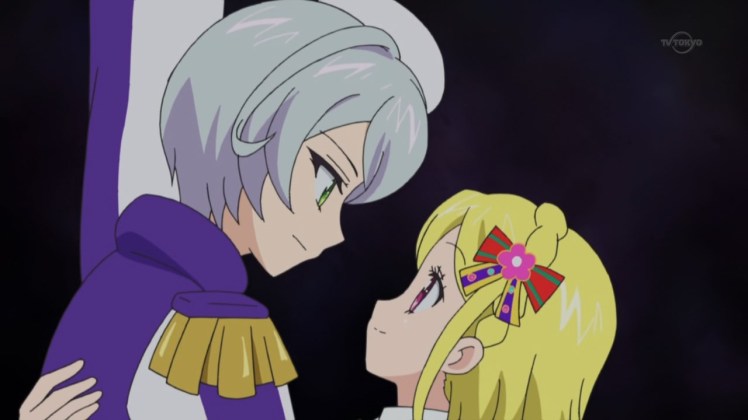 In the end, Fuwari does become the key to saving Hibiki from her pain and it’s confirmed that the feelings conveyed between the two at the very start of their arc were always real. They take stage together as prince and princess, regardless of them both being girls, to a cheering crowd. The princess saved the prince, who was also a girl, and they live happily ever after. It’s a rather fantastic moment as you realize that a series for kids not only negated gender roles, it reversed a damsel in distress trope and ended it on a canonical same-gender relationship. They don’t spell it out, though the word “koibito” (lovers) is used for them in the third season, but any child watching know what a prince and princess going off to live together means.
In the end, Fuwari does become the key to saving Hibiki from her pain and it’s confirmed that the feelings conveyed between the two at the very start of their arc were always real. They take stage together as prince and princess, regardless of them both being girls, to a cheering crowd. The princess saved the prince, who was also a girl, and they live happily ever after. It’s a rather fantastic moment as you realize that a series for kids not only negated gender roles, it reversed a damsel in distress trope and ended it on a canonical same-gender relationship. They don’t spell it out, though the word “koibito” (lovers) is used for them in the third season, but any child watching know what a prince and princess going off to live together means.
Hibiki and Fuwari return in season three as well, and while it’s unrelated to her gender, Hibiki’s healing process continues throughout that season. PriPara doesn’t simply say that by accepting someone into your heart all your personal problems will go away, instead it devotes an extended character arc for Hibiki to come to terms with accepting friendship as a real thing and not a lie. It’s not easy for her and it takes quite some time, which is something we deeply appreciate the series for. It’s too common to see trauma get brushed aside the moment a happy thing happens to someone, but it’s rarely that easy to overcome. With that PriPara says that needing time to heal is also something to be accepted.
It goes without saying that Shikyoin Hibiki is our favourite character in PriPara, as we found every moment of her development truly breathtaking in its execution. We loved how they treated her being anti-social from personal trauma as a serious subject, we loved that a girl could play a prince and be better at it than anyone else, we love that her voice is so incredibly deep. But most of all we love that she’s a character with serious wounds and flaws that don’t just exist to make her appear evil, but rather to show that she needs help from those who care for her. Fuwari may not be the ideal fairytale princess, but she’s exactly who Hibiki needed. Someone who she knows won’t abandon her and who will help her overcome her issues at her own pace.
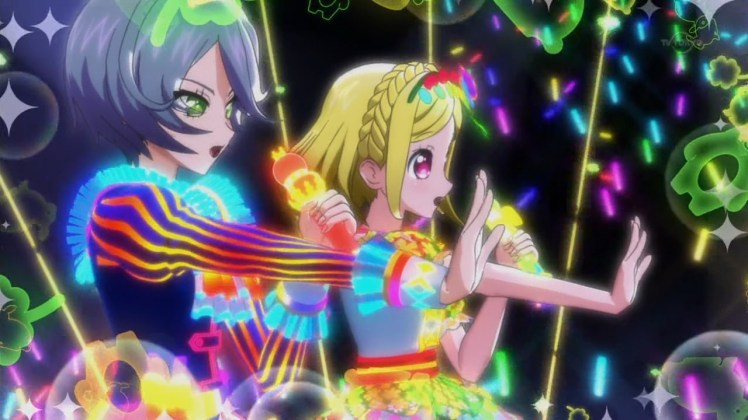 There are more characters than the ones we’ve mentioned that go through stories of acceptance in PriPara, but these were the ones we wanted to talk about. Because PriPara does something no other piece of fiction has ever been able to do for us. It helps us love ourselves. When we watch PriPara we don’t hate our deep voice, we don’t hate our broad shoulders or that we’re tall. When we watch PriPara we don’t hate that we’re not trauma-free or that we will never fully be what some would dictate as female. PriPara tells us that all those things about us are lovely and that there will be people who accept us for being the person we are or aim to be.
There are more characters than the ones we’ve mentioned that go through stories of acceptance in PriPara, but these were the ones we wanted to talk about. Because PriPara does something no other piece of fiction has ever been able to do for us. It helps us love ourselves. When we watch PriPara we don’t hate our deep voice, we don’t hate our broad shoulders or that we’re tall. When we watch PriPara we don’t hate that we’re not trauma-free or that we will never fully be what some would dictate as female. PriPara tells us that all those things about us are lovely and that there will be people who accept us for being the person we are or aim to be.
Thank you PriPara, for helping us love ourselves.
This is where we unfortunately need to mention that PriPara is not officially licensed for distribution in the west, save for the fourth season, and there’s no official stream online. Attempts at licensing the series for an English dub was made but never picked up. There are fan-made subtitles for the series, but it’s split between multiple groups. It makes me sad as we want PriPara to be easy to find and enjoy, because we think it could help many more feel better about themselves.
Finally, I’ll end by saying that we’re hoping the upcoming fourth season, Idol Time PriPara can live up to this wonderful legacy by introducing more examples of acceptance and gender non-conformity as a positive.
This was a really great post! Thanks for this; I never would’ve thought this show would’ve dealt with such topics and themes. I should reconsider. 🙂
LikeLiked by 1 person
im watching through the whole series and i really hope hibiki actually apologizes and makes an effort to fix their mistakes
LikeLike
saw this linked on tumblr… honestly cant fuckin believe people can support assholes like you… youre a cunt misgendering reona on purpose yet preaching about love being positive trans representation as if you care…
btw you literally dont know any characters names so why talk about the show if youre too lazy to find out laala, sophy, sion and reonas names
LikeLike
You forgot Dorthy.
Leona isn’t canonically trans, I didn’t misgender him. If you headcanon characters as trans, that’s great, I even said so in the post. But please, pretend I don’t care about trans rep after being a trans person promoting an entire series on how it handles gender.
Laala, Sophy, Sion, Reona, Dorthy and more names are official romaji spellings but the beautiful thing about romaji is that it’s a subjective thing that one can write in multiple ways.
If you think I misgendered Leona, then you also believe the anime misgenders Leona.
LikeLiked by 1 person
She didn’t misgender Leona, he is a boy. 😑 And since the anime isn’t actually properly translated, but instead by fans, there are some things that are different like names. Besides it doesn’t even matter how she spells their name, we all know who she is talking about. Take your negativity away, this was a wonderful post, that brought out all of Pripara’s good points.
LikeLiked by 1 person
Reblogged this on Jackninja5.com.
LikeLike
i loved this! i recently convinced my partner to watch it and she loves it too! i really hope it can be out for distribution in the west at some point. im planning to import the dvds from japan so i can just have them, this series is so dear to me. i began watching a year after it premiered and ive been obsessed since. i remember when this show was virtually unknown outside japan and i had to watch each episode raw and it actually was refreshing as i had to actually pay close attention to understand the story & the complex characters. such an amazing show. ♡ promise, rhythm, paradise !
LikeLike
I want to know what episode is this, leona west with pink long hair.
LikeLike